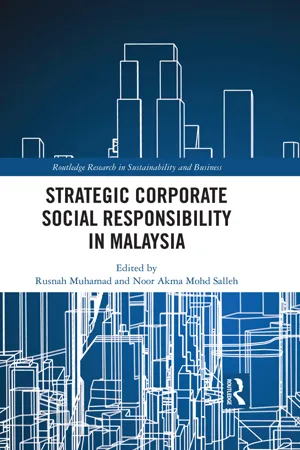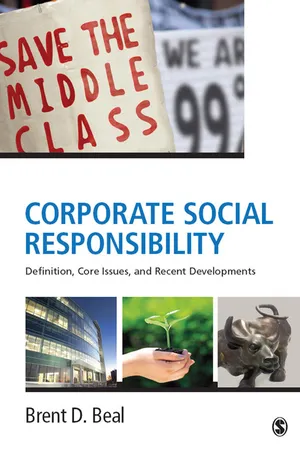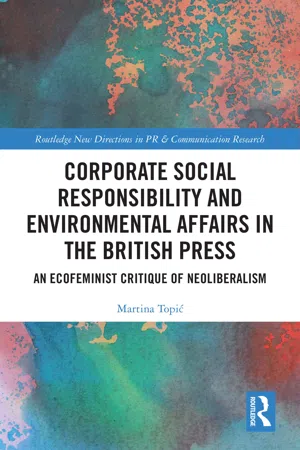Corporate Social Responsibility
Corporate Social Responsibility (CSR) refers to a business practice that involves integrating social and environmental concerns into a company's operations and interactions with stakeholders. This includes initiatives to support local communities, reduce environmental impact, and uphold ethical business practices. CSR aims to contribute positively to society while also enhancing the company's reputation and long-term sustainability.
7 Key excerpts on "Corporate Social Responsibility"
- Rusnah Muhamad, Noor Akma Mohd Salleh, Rusnah Muhamad, Noor Akma Mohd Salleh(Authors)
- 2019(Publication Date)
- Routledge(Publisher)
...2 Corporate Social Responsibility engagement by companies Theory, concept, model, and impact Rusnah Muhamad, Noor Akma Mohd Salleh, and Ibrahim Mohd-Sabrun Introduction The increasing complexity and turbulence of the environment means that companies need to develop competitive management models aimed at not only obtaining profit margins in the short term, but also at meeting the balanced expectations of society and the different stakeholders involved in its activities in the long term (Crane, McWilliams, Matten, Moon, & Siegel, 2008; Solano, Casado, & Ureba, 2016). Regarding these requirements for companies, CSR has been proclaimed in recent years as a key tool that helps companies meet these environmental pressures as well as improving their competitiveness as a result (Aguilera, Rupp, Williams, & Ganapathi, 2007; Boulouta & Pitelis, 2014; Carroll & Shabana, 2010). Corporate Social Responsibility (CSR) is a broad term that is used to describe a company’s efforts to improve society in some way. These efforts can range from donating money to non-profits to implementing environmentally friendly policies in the workplace. CSR is important for companies, non-profits, and employees alike. Analysis of the CSR concept reveals that for a long period of time, companies have played a fundamental and exclusive economic function in society, contributing actively in the distribution of goods and services as well as the generation of wealth and employment...
- eBook - ePub
Corporate Social Responsibility
Definition, Core Issues, and Recent Developments
- Brent D. Beal(Author)
- 2013(Publication Date)
- SAGE Publications, Inc(Publisher)
...Evolving CSR reporting standards, such as GRI’s reporting framework, have largely adopted this same structure (i.e., a tripartite focus on economic, social, and environmental responsibilities). In its current form, the term sustainability is more or less synonymous with CSR, and in certain contexts (e.g., in academic circles in Europe), it now appears to be the preferred label for efforts to address the business and society interface. Corporate citizenship is another concept that is often associated with CSR. Corporate citizenship tends to be more practitioner-based than CSR, and is centered around the idea or metaphor of the corporation as a good neighbor or virtuous citizen. xxiii Corporate social performance, another related concept, adopts as a conceptual starting point the responsibility of businesses to sense and then respond to evolving social expectations. xxiv In the 1950s, CSR generally took the form of charitable giving; this history continues to be reflected in CSR’s close association with corporate philanthropy and other forms of community involvement. xxv At least two other related concepts deserve mention: stakeholder theory and systems theory. Stakeholder theory emerged in the early 1980s as a new way of thinking about corporate strategy. xxvi From a stakeholder perspective, instead of working primarily to maximize returns to shareholders, managers should consider the needs of a broad range of stakeholders, defined as “those groups and individuals that can affect, or are affected by, the accomplishment of organizational purpose.” xxvii Managers should seek to guide the business in a way that creates value for all stakeholders...
- Su Mi Dahlgaard-Park(Author)
- 2015(Publication Date)
- SAGE Publications, Inc(Publisher)
...Corporate Social Responsibility Corporate Social Responsibility 91 94 Corporate Social Responsibility In this entry, the concept of Corporate Social Responsibility (CSR) isdiscussed—a concept that has become quite prominent for many organizationsbut that is also surrounded by debate and ambiguity. Although much attentionhas focused on CSR in production-based organizations, services industriestoday are also heavily involved in shaping CSR policies and practices.Besides, given its focus on issues of responsibility, CSR may alsocontribute to a better quality of life. After briefly highlighting some of the many CSR interpretations, the growingattention for CSR is discussed. Then, this entry turns to some pressingissues for further research and concludes with a number of themes that aredominant in the current literature. Defining Corporate Social Responsibility Over time, CSR and several related concepts such as corporate citizenshipand corporate social performance have often been used to cover a lot ofdifferent meanings. Although CSR has been studied from a wide variety ofangles, such as business ethics, business administration, economics,law, international relations, and sociology, not much agreement on itsprecise definition has emerged. CSR has to do with the relationshipbetween business organizations and the societies with which theyinteract, but how these relationships are to be defined continues to bean issue for debate. Following Archie Carroll’s seminal work, and referring to its backgroundin business ethics, key elements of CSR include the different types ofresponsibilities that business organizations face: economic, legal,ethical, and discretionary responsibilities. Firms need to live up toeconomic expectations, within a given legal and normative framework. On top of theseresponsibilities, firms can do more and deal proactively with societaldemands...
- eBook - ePub
- David Chandler(Author)
- 2020(Publication Date)
- Routledge(Publisher)
...Principle 4 CSR is a stakeholder responsibility Key takeaway: CSR will only work if firms are rewarded for acting and punished for failing to act. As such, while CSR includes a responsibility for a firm to meet the needs and demands of its stakeholders, the stakeholders themselves have an equal, if not more important, responsibility to hold the firm to account. As illustrated by Principle 3, business is a collective enterprise that is defined by the firm’s stakeholder relationships. A firm that is acting responsibly is seeking to create value for all of these stakeholders. In doing so, that firm is also acting in its own best interests, as measured over the medium to long term. But, within this complex web of complementary and conflicting relations, exactly whose responsibility is CSR? The term Corporate Social Responsibility misleadingly suggests that the burden rests solely (or even largely) with the firm. Corporate Social Responsibility The entirety of CSR can be discerned from the three words this phrase contains: corporate, social, and responsibility. CSR covers the relationship between corporations (or other for-profit firms) and the societies with which they interact. CSR defines society in its broadest sense and, on many levels, to include all stakeholders that maintain an ongoing interest in the organization’s operations. And, as interpreted by the majority of advocates, CSR also includes the responsibilities that the firm has to these varied constituent groups. What this discussion ignores, however, is an understanding of where the motivation for socially responsible behavior comes from...
- eBook - ePub
- S.M.Riad Shams, Demetris Vrontis, Yaakov Weber, Evangelos Tsoukatos, Antonino Galati(Authors)
- 2019(Publication Date)
- Routledge(Publisher)
...have economic, legal, ethical, and philanthropic obligations to their stakeholders. Economic responsibility: Businesses should create earnings, jobs, and prosperity. Legal responsibility: Firms are obliged to adhere to the federal and state rules and regulations, which makes the firm eligible to conduct its business legally. Ethical responsibility: Stakeholders anticipate firms’ exhibiting ethical responsibility that is a consideration for what customers, suppliers, human resources, society, and other shareholders believe is fair and just in accordance with moral standards. Moreover, stakeholders believe that firms should act above the federal and state rules and regulations to achieve societal goals (e.g. improve the working environment for staff and create and implement a code of ethics as well as social reporting in accordance with corporate governance actions). Philanthropic responsibility: Businesses that are part of good corporate citizenship are expected to get involved in actions that stimulate quality of life and prosperity (e.g. giving donations and philanthropic contributions to local or international communities in order to encourage and assist noble actions). Asongu (2007) stated that CSR is beyond financial and legal responsibilities taking into consideration all stakeholders’ needs and assisting local and international communities to improve their quality of life and the environment. According to Tang and Li (2009), stakeholders of some prestigious corporations in China view CSR strategies as either philanthropy (scholarships to students, financial assistance to nonprofit organizations, poorness decline, environment protection, collaboration with other organizations, etc.) or business practice (quality and safety of the product/services delivered, human resources health, safety and equal opportunity, CSR strategies to suppliers and other stakeholders, etc.). Benefits of CSR – Financial Performance – Sustainability According to Visser et al...
- eBook - ePub
Corporate Social Responsibility and Environmental Affairs in the British Press
An Ecofeminist Critique of Neoliberalism
- Martina Topić(Author)
- 2021(Publication Date)
- Routledge(Publisher)
...595) because even though there are many different definitions of CSR no agreement has been made as to how to define this term. This is because CSR can mean different things and the meaning changes as to how one defines it. Campbell (2007) stated that social responsibility should be defined as a type of behaviour that cares for the local environment, or as a type of behaviour that is considered acceptable in a community where a company is working. In this view, many people understand social responsibility in many ways, but essentially this means that companies, … must not knowingly do anything that could harm their stakeholders – notably, their investors, employees, customers, suppliers, or the local community within which they operate. Secondly, if corporations do cause harm to their stakeholders, they must then rectify it whenever the harm is discovered and brought to their attention. Campbell (2007, p. 951) On the other hand, other authors are arguing that discussions on CSR have been polarised because “corporations are often portrayed as saviours and benefactors which can contribute positively to social development by generating economic opportunities and lifting people out of poverty” and “corporations are also portrayed as sinners and adversaries, who by virtue of their profit-maximizing raison d’être are incapable of generating social good” (Dhanesh, 2014, p. 158, emphasis in the original). As a way of overcoming problems with defining CSR, some authors proposed a dual model that will assess companies on a responsible/irresponsible scale. Jones, Bowd and Tench (2009) proposed a CSR-CSI model (Corporate Social Responsibility – Corporate Social Irresponsibility) to overcome difficulties in understanding CSR. In that, they argued that “CSI is a term better suited to describing the workings of the ‘old’ shareholder business model […] and that CSR is more applicable to the workings of the new and emerging stakeholder business model” (Jones et al., 2009, p. 301)...
- Steven G. Rogelberg(Author)
- 2016(Publication Date)
- SAGE Publications, Inc(Publisher)
...In fact, it is becoming more common for scholars to refer to a much broader domain of corporate responsibility, including social, political, economic, and environmental responsibilities. Bryan Husted has pointed out the origins of CSR practices going as far back as 1800. The general rationale for the CSR (or corporate responsibility) viewpoint is that, from a moral perspective, the modern corporation’s power to do great good or harm necessitates considering all of its direct and indirect effects on society. In addition, a corporation is granted certain benefits by the state, such as limited liability for its owners and managers; indeed, as a legal entity, the corporation’s very existence is created by the state. Corporations are also granted benefits by the communities in which they reside, such as clean air, police and fire protection, transportation infrastructure, and the like. Therefore, they accrue reciprocal obligations to contribute to overall well-being. The classical business model had applied social contract theory from political philosophy to the economic world of business to justify the voluntary association of shareholders to advance their profit motives. It is extended further by the revisionist model as the moral basis for the existence of the corporation and the means of understanding its relationship to society. Two themes are apparent...






